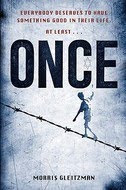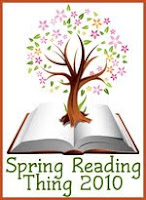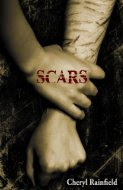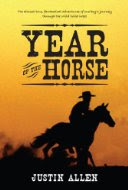Allen, Justin. Year of the Horse: A Novel. New York: The Overlook Press, 2009. Print.
[Book cover credit: librarything.com/work/8981909]
Booktalk:
Every boy in St. Francis knows who Jack Straw is. Every boy in the
country probably knows who Jack Straw is. He's the fastest gunslinger in the West. When he shows up at Lu's family's shop to visit with Lu's grandfather, Lu naturally eavesdrops so he'll have stories to tell his friends at school the next day. Instead, he's woken up early the next morning to leave with Jack as his explosives expert, a title that both this grandfather and late father each held, but that Lu himself does not identify with and feels he can't live up to.
Review:
Lu, the child of Chinese immigrants; Henry, first a slave then a Union soldier and now free; Chino, once just a Californian and now a Mexican with no homeland; and of course Jack Straw, also a former Union soldier and now a privateer of sorts; are all hired by John MacLemore, former Confederate loyalist, and his daughter Sadie to get their gold mine and homestead back from the man who murdered Sadie's mother. They travel across mountains, canyons, plains, and deserts. They also deal with Mormons (one of whom really wants to make Sadie one of his wives), dwindling supplies (
Oregon Trail style), fatal weather, Confederate soldiers, many forms of racism, and, of course, actual demons.
That's right. This is a Western/fantasy, and as such, it's pretty unique.
I'll be honest, the first half, almost pure Western, was a bit slow for me. I liked getting to know the large cast of characters and found their trials pretty interesting, but I wasn't truly hooked until the fantasy set in. When it did, I felt the need to devour the second half of the book to find out what would happen to everyone. At the expense of my beauty sleep. The forgotten journal of a man no one remembers that is covered with Lu's grandfather's Chinese writing, ghost-riders that pretend to be shooting stars, were-coyotes in the middle of an unlivable desert. And none of that even begins to encompass what Lu, et al. are
really up against. It's good stuff. I highly recommend this book for fantasy readers who are sick of paranormal romances taking up all of the magic in young adult lit right now and for adventure readings who might be willing to let the truth stretch a little. Neither group will regret the small step outside of their comfort zones.
Now on to the serious stuff. One of the greatest things about this book is the large cast of multicultural characters. We are also given main characters that hail from both sides of the recently ended Civil War, in addition to soldiers in saloons with differing loyalties. This book does NOT use the /fantasy part of its description to make all of these people live together harmoniously. From the author's note:
"Not all of the characters in this book are to be admired, however. History, as it turns out, is littered with men and women (and boys and girls!) possessed of vile, even shocking beliefs, language and manners. As your narrator I will admit having felt tempted to censor the more disturbing bits of racism from the nineteenth century folk that people these tales. But as fact is my watch-word, I have resisted that temptation."
p.7
And it's true, Allen doesn't remove the racism from the story. I don't think the n-word makes an appearance (not that Henry is called by his name by anyone outside the group), but Lu gets called a chink often (not within the group), or better yet, referred to as "Jack's chink." What Allen does, instead of removing the racism from the book, is take all of these characters beyond their stereotypes for the readers. Yes, Lu starts out as the explosion expert because, genetically, he must know how it's done, right? He is Chinese, after all. But then we also see Jack teaching Lu how to blow up a boulder early on in the trip. All of the other characters similarly move beyond their stereotypes: the rich Confederate and his wild-child daughter, the religious former slave and the nature-conscious Mexican, a variety of mystic and/or violent American Indians and the wife-hunting Mormons. It's all very
Breakfast Club, except without the all-white cast.
Book source: Philly Free Library
This book fulfills the Bad Blogger category of the 2010 Challenge; I heard about it during the
Unsung YA Blogger Blitz.





